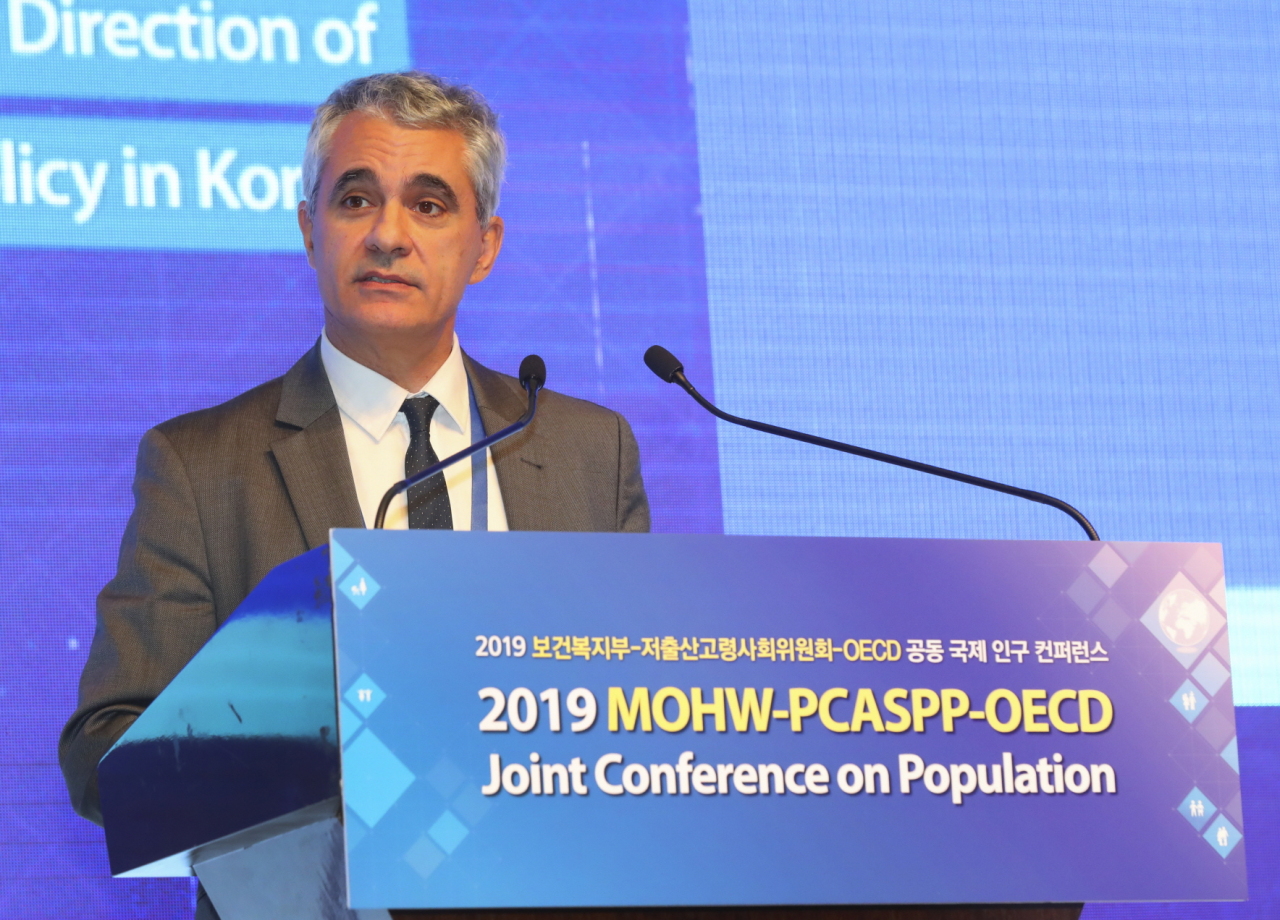[Newsmaker] Workplace gender discrimination hurts Korea’s fertility rate: OECD
By Kim ArinPublished : Oct. 28, 2019 - 18:09
Gender discrimination in the workplace is responsible for Korea’s low fertility rate, according to the Organization for Economic Cooperation and Development.
Korea’s Ministry of Health and Welfare and the OECD held a joint conference on Monday to address policy responses to the country’s declining fertility rate.
“Governments need to modernize their family policies to provide families with a continuum of support, from birth to adulthood,” said OECD’s Director for Employment, Labor and Social Affairs Stefano Scarpetta.
“Korea’s response to the challenges brought about by its rapidly shifting demographics is a lesson that can be used throughout the world.”

Korea’s birthrate fell below 1 child per woman in 2018, dipping to an all-time low of 0.97. The figure stands as the lowest among OECD member states.
The low birthrate is largely attributable to difficulties in attaining work-life balance for employees and gender inequality at work, according to Chris Clarke, an economist in the OECD’s social policy division.
“There are clear institutional features in the Korean labor market that make it difficult for parents, and for mothers in particular, to balance work and family,” he said.
The OECD’s 2018 data shows that Koreans not only work long hours -- second only to Mexico among the group -- their travel to and from work is the longest, and they are also pressured to socialize with co-workers after work.
Such a labor culture has adverse effects on workers’ quality of life, Clarke said, which manifests as OECD’s second lowest job satisfaction for employees in Korea.
Motherhood remains a strong factor for women in Korea to leave work.
“Many women, rather than men, feel they have to choose between work and children. While this trend is not unique to Korea, this is no longer as stark in other OECD countries,” Clarke said.
Women, especially mothers, more often work nonregular jobs than men in Korea, and are heavily concentrated in low-paid employment. Korea also has the largest gender pay gap in the OECD at 37 percent, much more than double the OECD average of 14 percent. It also has the lowest proportion of women in management positions.
The Ministry of Employment and Labor’s women’s employment policy division director, Lee Hyun-ok, said women-specific employee child care benefits negatively impact women’s employment and advancement at work.
“Women take 10.1 months of parental leave on average, much longer than men’s 6.6 months. Policies that mandate longer leaves for women may in turn discourage employers from hiring women,” she said, stressing, “Even parental leave entitlements to both men and women should be mandated, to tackle workplace gender gap.”
“Women taking longer parental leave than men drives discrimination (at work),” Clarke said.
“One possible solution to this is making at least a part of paternity leave mandatory,” he said. “This goes some way to enforcing the idea that (child care) is men’s responsibility as well as women’s.”
“Korea has the most highly educated young, female population in the OECD. There is an awful lot of talent out there that Korea should be working hard to attract,” he said.
Veerle Miranda, a senior economist for the OECD who specializes in youth policies, said young people in Korea enter the labor market at a relatively older age, a delay that postpones family formation, and in turn affects fertility rate.
“One in 5 young Koreans are neither in employment or education,” she said. “Upon review, we find most of them are preparing for entry exams to large corporations or to public sector – which have higher job security and better benefits.”
Miranda pointed out that while Korean government has been active in introducing youth support measures in employment, the existing regulations are often not enforced.
“The regulations are there, it’s just that often they are not put in practice,” she said. “The government should do a better job at monitoring and force legislations that are already in place.”
By Kim Arin (arin@heraldcorp.com)








![[Kim Seong-kon] Democracy and the future of South Korea](http://res.heraldm.com/phpwas/restmb_idxmake.php?idx=644&simg=/content/image/2024/04/16/20240416050802_0.jpg&u=)








![[KH Explains] Hyundai's full hybrid edge to pay off amid slow transition to pure EVs](http://res.heraldm.com/phpwas/restmb_idxmake.php?idx=652&simg=/content/image/2024/04/18/20240418050645_0.jpg&u=20240418181020)

![[Today’s K-pop] Zico drops snippet of collaboration with Jennie](http://res.heraldm.com/phpwas/restmb_idxmake.php?idx=642&simg=/content/image/2024/04/18/20240418050702_0.jpg&u=)